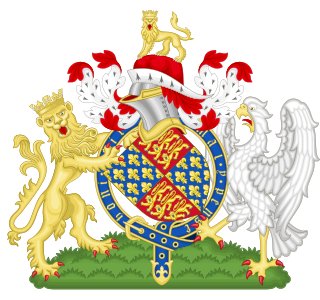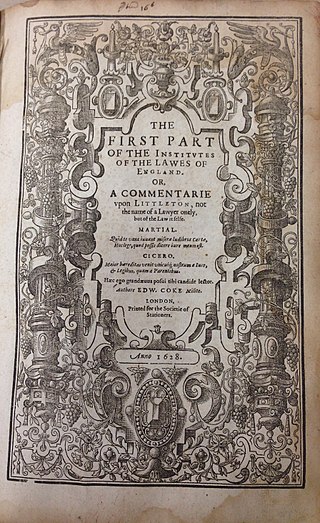Related Research Articles
The Assize of Clarendon was an act of Henry II of England in 1166 that began a transformation of English law and led to trial by jury in common law countries worldwide, and that established assize courts.
Assize or Assizes, in Old French originally "meeting, conference", may refer to judicial institutions or legal measures taken by those.

The Statute of Westminster of 1275, also known as the Statute of Westminster I, codified the existing law in England, into 51 chapters. Only Chapter 5 is still in force in the United Kingdom, whilst part of Chapter 1 remains in force in New Zealand. It was repealed in Ireland in 1983.
The Assize of Northampton, largely based on the Assize of Clarendon of 1166, is among a series of measures taken by King Henry II of England that solidified the rights of the knightly tenants and made all possession of land subject to and guaranteed by royal law.
Nisi prius is a historical term in English law. In the 19th century, it came to be used to denote generally all legal actions tried before judges of the King's Bench Division and in the early twentieth century for actions tried at assize by a judge given a commission. Used in that way, the term has had no currency since the abolition of assizes in 1971.
Citation of United Kingdom legislation includes the systems used for legislation passed by devolved parliaments and assemblies, for secondary legislation, and for prerogative instruments. It is relatively complex both due to the different sources of legislation in the United Kingdom, and because of the different histories of the constituent countries of the United Kingdom.
A free warren—often simply warren—is a type of franchise or privilege conveyed by a sovereign in medieval England to an English subject, promising to hold them harmless for killing game of certain species within a stipulated area, usually a wood or small forest. The sovereign involved might be either the monarch or a marcher lord.

The Act 7 Ric 2 c 5 (1383), sometimes called the Beggars Act, the Vagrancy Act, or the Vagabonds Act 1383, was an Act of the Parliament of England made at Westminster in 1383, after the Peasants' Revolt (1381).
In English law, the assize of novel disseisin was an action to recover lands of which the plaintiff had been disseised, or dispossessed. It was one of the so-called "petty (possessory) assizes" established by Henry II in the wake of the Assize of Clarendon of 1166; and like the other two was only abolished in 1833.
In English law, the assize of mort d'ancestor was an action brought where a plaintiff claimed the defendant had entered upon a freehold belonging to the plaintiff following the death of one of his relatives. The questions submitted to the jury were, "was A seised in his demesne as of fee on the day whereon he died?" and "Is the plaintiff his next heir?" This assize enabled the heir to obtain possession, even though some other person might have a better right to the land than the deceased.

The Institutes of the Lawes of England are a series of legal treatises written by Sir Edward Coke. They were first published, in stages, between 1628 and 1644. Widely recognized as a foundational document of the common law, they have been cited in over 70 cases decided by the Supreme Court of the United States, including several landmark cases. For example, in Roe v. Wade (1973), Coke's Institutes are cited as evidence that under old English common law, an abortion performed before quickening was not an indictable offence. In the much earlier case of United States v. E. C. Knight Co. (1895), Coke's Institutes are quoted at some length for their definition of monopolies. The Institutes's various reprinted editions well into the 19th century is a clear indication of the long lasting value placed on this work throughout especially the 18th century in Britain and Europe. It has also been associated through the years with high literary connections. For example, David Hume in 1764 requested it from the bookseller Andrew Millar in a cheap format for a French friend.

The courts of assize, or assizes, were periodic courts held around England and Wales until 1972, when together with the quarter sessions they were abolished by the Courts Act 1971 and replaced by a single permanent Crown Court. The assizes exercised both civil and criminal jurisdiction, though most of their work was on the criminal side. The assizes heard the most serious cases, most notably those subject to capital punishment or later life imprisonment. Other serious cases were dealt with by the quarter sessions, while the more minor offences were dealt with summarily by justices of the peace in petty sessions.

The Statute Law Revision Act 1948 is an Act of the Parliament of the United Kingdom.

The Statute of Northampton is legislation passed by the Parliament of England which met in Northampton in 1328. The parliament also ratified the Treaty of Edinburgh–Northampton which ended the First War of Scottish Independence.

The Statute of Winchester of 1285, also known as the Statute of Winton, was a statute enacted by King Edward I of England that reformed the system of Watch and Ward (watchmen) of the Assize of Arms of 1252, and revived the jurisdiction of the local courts. It received royal assent on 8 October 1285.
The Assize of Arms of 1252, also called the Ordinance of 1252, was a proclamation of King Henry III of England concerning the enforcement of the Assize of Arms of 1181, and the appointment of constables to summon men to arms, quell breaches of the peace, and to deliver offenders to the sheriff. British historian, F.M. Powicke identified that it was actually issued on 12 May 1242, but was subsequently transcribed incorrectly.

The Statute of Westminster of 1285, also known as the Statute of Westminster II or the Statute of Westminster the Second, like the Statute of Westminster 1275, is a code in itself, and contains the famous clause De donis conditionalibus, one of the fundamental institutes of the medieval land law of England.
Certain former courts of England and Wales have been abolished or merged into or with other courts, and certain other courts of England and Wales have fallen into disuse.
References
- David M Walker. The Oxford Companion to Law. Clarendon Press. Oxford. 1980. p 16. .
- Colin Rhys Lovell. English Constitutional and Legal History: A Survey. Oxford University Press. 1962. p 140.
- Owen Hood Phillips. "Citation". A First Book of English Law. Fourth Edition. Sweet & Maxwell Limited. New Fetter Lane, London. 1960. Page 98 et seq at pages 98 to 100.
- Owen Hood Phillips. The Principles of English Law and the Constitution. 1939. p 102. .
- Mr. Serjeant Stephen's New Commentaries on the Laws of England. 14th Ed. 1903. Volume 1. p 35. 12th Ed. 1895. Volume 1. p 67.
- Craies and Hardcastle. "Mode of citation of older Acts". Treatise on the Construction and Effect of Statute Law. 2nd Ed. 1892. Section 6 at p 57. There is a fuller list at "Popular or Short Titles of Statutes". p 604.
- Henry Raikes. A Popular Sketch of the Origin and Development of the English Constitution. W H Dalton. Cockspur Street, London. 1851. Volume 1. p 144.
- L S C, "Art VIII - Reddie's Historical Notices of Roman Law" (1836) 15 American Jurist and Law Magazine 342 at 346 (July)
- George Crabb. A History of English Law. First American Edition. Chauncey Goodrich. Burlington. 1831. pp 5, 222 & 223.
- Henry Cary (ed). A Commentary on the Tenures of Littleton. Saunders and Benning. London. 1829. p 47.
- 1 Blackstone's Commentaries (Hargrave's Edition) 86, note. (Note reproduced in Kerr's Edition, 1857, at p 68 of that edition, and in Wendell's Edition, 1850, at p 85 of that edition, attributing volume 1 to Hargrave).
- (1912) 77 The Westminster Review 364 (April)
- "The First Winter Meeting" (1905) 26 Proceedings of the Dorset Natural History and Antiquarian Field Club xxvii
- ↑ Clinton, A Compendium of English History, 1874, p 46
- ↑ Douglas and Greenaway. English Historical Documents, 1042-1189. 2nd Ed. 1981. Taylor & Francis. 2007. p 436
- ↑ Douglas and Greenaway, p 441
- 1 2 3 4 5 6 7 8 9 10 Crabb, p 223
- ↑ Coss and Lloyd (eds). Thirteenth Century England I: Proceedings of the Newcastle-upon-Tyne Conference, 1985. p 89.
- ↑ Craies and Hardcastle, p 610
- ↑ 34 Journal of the British Archaeological Association 452; 1 Ruffhead's Statutes at Large 76
- ↑ Edwards, Flintshire, 1914, p 104
- ↑ Oliver, The History of the City of Exeter, 1861, p 70. White. History, Gazetteer and Directory of the County of Devon. 2nd Ed. 1878 to 1879. p 323.
- ↑ Report on the Dignity of a Peer, 1820, p 258
- ↑ The Statute of Lincoln, 1316, and the Appointment of Sheriffs" (1917) 33 Law Quarterly Review 78; Ormrod, Killick, and Bradford (eds), Early Common Petitions in the English Parliament, c.1290-c.1420, p 25.
- ↑ Tyrrell, Bibliotheca Politica, 1718, p 380.
- ↑ Cobbett's Parliamentary Debates, 1838, Volume 43, Commons, 25 June, col 991; Joy, Letter to the Right Honorable Lord Lyndhurst on the Appointment of Sheriffs in Ireland, 1838, p 4.
- ↑ The Statutes: Revised Edition, vol 1, p 120; Cary, p 47.
- ↑ Betham, The Origin and History of the Constitution of England, 1834, p 141
- ↑ O Hood Phillips, 1960, p 98
- ↑ Brown, Northamptonshire, 1911, p 87
- ↑ Lynch, A View of the Legal Institutions, Honorary Hereditary Offices, and Feudal Baronies established in Ireland during the Reign of Henry the Second, 1830, p 60.
- ↑ Brown, Northamptonshire, 1911, pp 87 & 89.
- ↑ O Hood Phillips, 1960, p 100